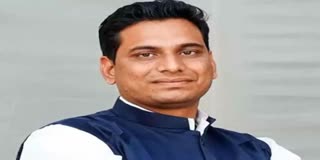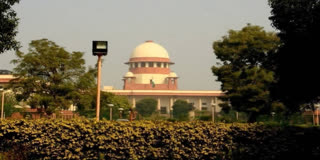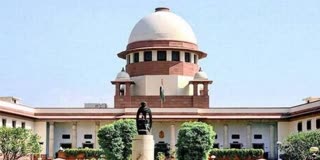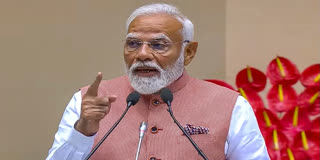Virtual court proceedings amid COVID-19-induced lockdown
With the spread of coronavirus disease and the nationwide lockdown prompting the Supreme Court and various High Courts to conduct judicial proceedings online, Zulqarnain Zulfi, in this article, shares his experience of attending a virtual court proceeding conducted by the Jammu and Kashmir High Court using VIDEO app, a specially designed application for the purpose. Zulfi had attended the virtual hearing of a petition filed by President of Kashmir Bar Association Mian Abdul Qayoom demanding his release citing health issues. He was arrested under the Public Safety Act (PSA), last year, soon after the abrogation of Article 370 and 35A.

Srinagar (Jammu and Kashmir): The pandemic has brought almost the entire world to a near-standstill, and Indian court's justice delivery system too has been affected to a large extent. Now with the Supreme Court's guidelines for the functioning of courts through Video Conferencing in place, many important cases are being held in a virtual courtroom with judges, petitioners and respondents as participants.
Yesterday, this reporter of ETV Bharat was lucky enough to witness an important court proceeding of a case in which President of Kashmir Bar Association Mian Abdul Qayoom has filed a petition for his release citing health issues. He was arrested under the Public Safety Act (PSA), last year, soon after the abrogation of Article 370 and 35A. This reporter has earlier witnessed several cases in the courtrooms but the experience in the virtual one was altogether different and interesting.
Before I share my whole experience, let me tell you the Jammu and Kashmir High Court uses VIDEO app, a specially designed application for court proceedings. The app allows sharing of documents related to the case while the proceeding is underway. The petitioner has to register for a virtual courtroom in advance.
"There is a lockdown in the city and as such cases are not held in physical courtrooms but in virtual ones. The petitioner or his/her advocate have to prior inform the registrar of the JK HC for the hearing. We can also contact the concerned Judge, as per the roster, for the same. If permission is granted then the date and time for the case proceeding is fixed," Advocate Mian Tufail Ahmad, who was part of Mian Qayoom's legal team, explained.
He said, "It is the judge's discretion whether the proceedings will be held via video or call conferencing. In Qayoom sir's case, video conferencing was approved. Sometimes due to poor connectivity proceedings get rescheduled. We have faced such situations in earlier hearings too."
On being asked whether journalists or any third party is allowed to witness the whole proceedings, he clarified, "According to the High Court circular, journalists can be part of proceedings only in "reportable" case. They are not allowed to video record but can record audio and other details. However, social, physical distancing and other COVID-19 prevention norms must be maintained. All rules of the physical courtroom are applicable but in virtual mode."
THE COURT PROCEEDINGS
In the Mian Abdul Qayoom case, the bench of the High Court comprising of Justice Ali Muhammad Magray and Justice Vinod Chatterji Koul was scheduled to pronounce judgement at 11 am. The court had earlier completed all the proceedings related to the case on May 18.
This reporter along with two other journalists from the Valley was invited by one of the lawyers from the Mian Qayoom legal team for pronouncement of judgement by the bench. The look and feel of the lawyer's residence turned into a virtual courtroom was worth noticing. With lawyers and judges dressed in black coats and gowns as if they are in the Court itself, the only difference was hard disks and pen drives were handy instead of huge hardcopies of documents.
The moment the VIDEO app was turned on the senior lawyer was apprehensive about the internet speed as last time hearing had to be rescheduled after the application couldn't be loaded despite several attempts. We were told to keep phones on flight mode and maintain the required distance and silence when judgement will be pronounced. The application connected only after three to four attempts.
'ONE SCREEN, TEN WINDOWS'
As soon as the application loaded, we were able to see Justice Magray, Justice Koul, Senior Advocate Zaffar Shah, Advocate Mian Tufail Ahmad, Advocate N. A. Ronga, Advocate General D.C. Raina, Senior Additional Advocate General B. A. Dar, Additional Advocate General Shah Aamir, Additional Advocate General Aseem Sawhney, Assistant Solicitor General of India Tahir Majid Shamsi but jailed Kashmir Bar President Mian Abdul Qayoom was nowhere to be seen.
It was later explained to us by the Senior Advocate that "If the Judge wishes then only the petitioner is called in. Also, today was only the pronunciation of the verdict."
With formal greeting and after testing all connections, including internet speed check, Justice Magray started pronouncement of the verdict. During his ten minutes long monologue, Justice Magray while dismissing the petition and Justice Magray said: "To sum up, a law of preventive detention is not invalid because it prescribed no objective standard for ordering preventive detention, and leaves the matter to the subjective satisfaction of the Executive. The reason for this view is that preventive detention is not punitive but preventive and is resorted to prevent a person from committing activities regarded as prejudicial to certain objects that the law of preventive detention seeks to prescribe."
He further said, "Preventive detention is thus, based on suspicion or anticipation and not on proof. The responsibility for security of State, or maintenance of public order, or essential services and supplies, rests on the Executive and it must, therefore, have necessary powers to order preventive detention. Having said that, subjective satisfaction of a detaining authority to detain a person or not is not open to objective assessment by a Court. A Court is not a proper forum to scrutinise the merits of administrative decisions to detain a person. This matter lies within the competence of the Advisory Board. While saying so, this Court does not sit in appeal over the decision of detaining authority and cannot substitute its own opinion over that of detaining authority when grounds of detention are precise, pertinent, proximate and relevant."
"We have gone through intelligence reports which contain materials after 2010 depicting the activities of the detenu based on which the detaining authority has shown to have arrived at satisfaction reflected in the detention order. These reports could be well said to constitute new facts, Justice margay said while adding, "An ideology of the nature reflected in the FIRs and alleged against the detenu (Qayoom) is like a live volcano. The four FIR registered against the detenu in 2008 and 2010 and his alleged activities after registration of said FIR's has been brought before the court which makes it clear there is a live link between his past activities and the fresh ones while mentioning that the detenu has not shunned his ideology."
Justice Koul pronounced the final words of the judgement, saying, "In light of the above legally rightful and sound argument taken by the Advocate General, we leave it to the detenu to decide whether he would wish to take advantage of the stand of the Advocate General and make a representation to the concerned authorities to abide by it. It is to the discretion of the government and of the concerned/competent authority (ies) to decide terms of the relevant provision(s) of the JK PSA on any such representation is made, by the detenu. It is made clear that an adverse order on any such application, if made, shall not entail any legal proceedings, whatsoever."
During pronouncement of the verdict, Zaffar Shah and other lawyers tried to counter AAG B.A. Dar's argument mentioned in the verdict but the bench didn't consider any of the points raised by the Mian Qayoom's legal team.
Soon after the pronouncement of the judgement, the dejected senior lawyer said: "We lost the case. That's all. We will still look for other options. We must wait for sometime before announcing our next course of action."






